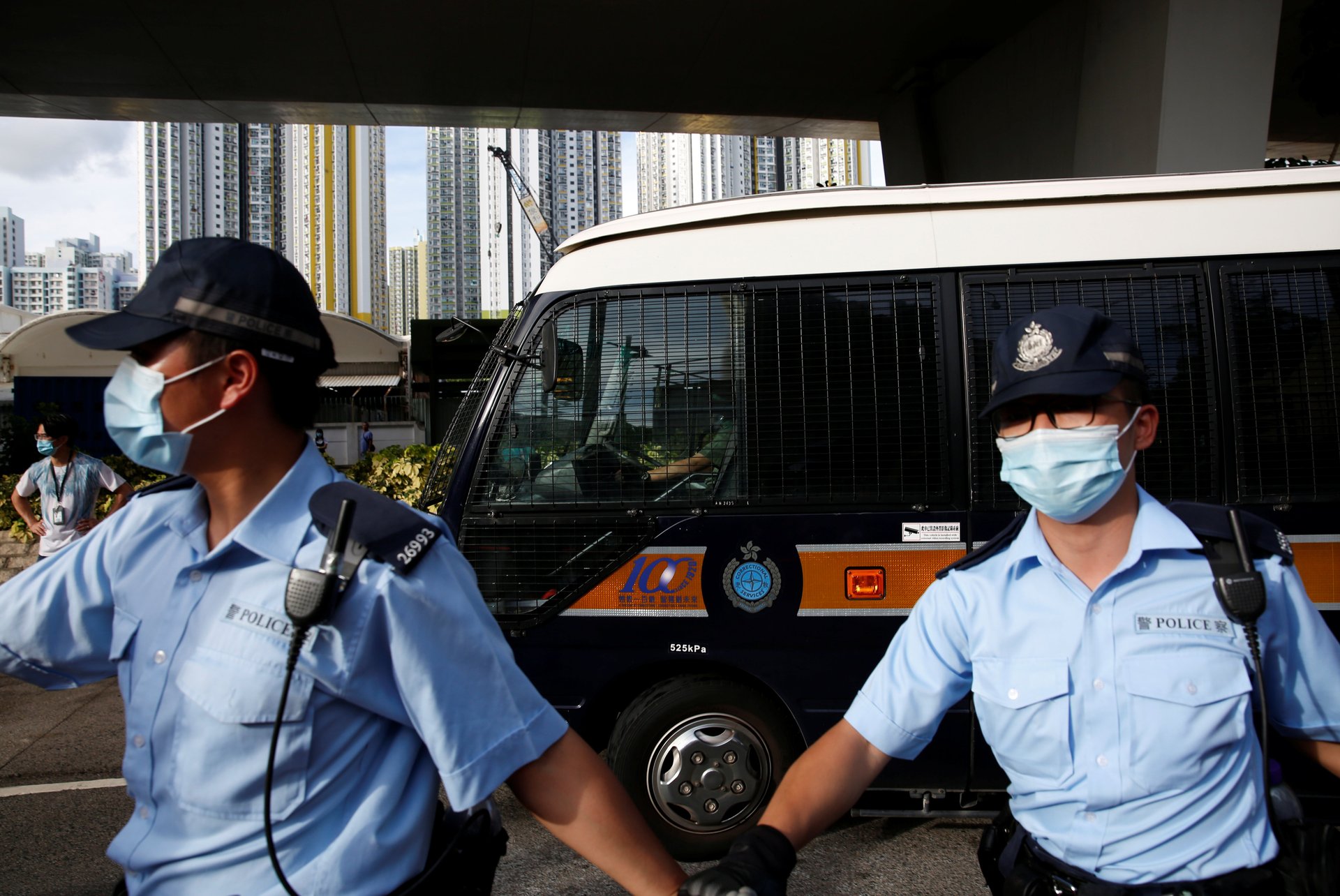Hong Kong’s first national security law verdict shows Beijing’s “red line” has become a red net
Hong Kong’s first national security trial ended in a guilty verdict for Tong Ying-kit on charges of secession and terrorism—two vaguely defined crimes under the sweeping national security law. The 24-year-old now faces up to life in prison.


Hong Kong’s first national security trial ended in a guilty verdict for Tong Ying-kit on charges of secession and terrorism—two vaguely defined crimes under the sweeping national security law. The 24-year-old now faces up to life in prison.
The landmark guilty verdict, delivered by three judges hand-picked by the Hong Kong’s top official to hear national security cases rather than a jury, also has wide and grim implications for free speech and political expression in a city increasingly pulled into the orbit of authoritarianism.
It appears more certain than ever that Beijing’s talk of laying down “red lines” is not intended to delineate limits of speech, but rather to ensnare opponents in a giant red dragnet.
A low bar for criminalizing speech
At the heart of the trial, which took place over 15 grueling days beginning in late June, was whether the protest slogan “Liberate Hong Kong, revolution of our times,” emblazoned on a flag that Tong flew on his motorbike last July before colliding into a group of police officers, amounts to inciting secession. For days, the prosecution and defense dueled over the etymology of those seven words, at one point even debating the legacy of Malcolm X, the famed US civil rights leader .
Perhaps most worrying about the verdict is how it dramatically lowers the bar for criminalizing speech. Prosecutors had argued that the protest slogan is clearly secessionist because it calls for Hong Kong to be liberated from an enemy, taken in this case to mean Beijing. Defense experts acknowledged that this could be one of its many interpretations, but emphasized that the slogan could mean different things to different people at different times.
The judges rejected the defense’s argument. What concerns the judges “is not whether the Slogan meant one and only one thing…but whether the Slogan, when taken as a whole after considering all the relevant circumstances, was capable of inciting others to commit secession.” Taking into account the various possible meanings of the protest slogan, the judges concluded that it was “at the very least capable of having [a secessionist] meaning.”
That a phrase can be deemed secessionist because there exists the possibility that it has multiple interpretations, including a separatist one, makes it much easier for authorities to criminalize speech.
This leaves the question of intent: did Tong intend to incite secession? The judges concluded that Tong was “deliberately displaying the flag,” and “fully understood the Slogan to bear the meaning of Hong Kong Independence.” Citing the route he took and the significant date of the journey—July 1, 2020 is both the anniversary of Hong Kong’s handover to China and the first full day the national security law took effect—they wrote that Tong “intended to convey the secessionist meaning of the slogan,” thereby inciting others to commit acts separating Hong Kong from China. No specific acts by others, however, were attributed to Tong’s actions.
“The judgment appears to ignore free speech principles,” said Michael Davis, a global fellow at the Woodrow Wilson International Center in Washington and author of Making Hong Kong China. He cited the Johannesburg Principles, an internationally recognized set of legal guidelines on security law developed in the 1990s, which stipulate that expression deemed to threaten national security must be intended to incite imminent violence.
“In other words, it is not enough that the speaker is voicing an opinion about his or her preferred political decision, but rather the context and the speaker’s intention must converge to make the alleged unlawful action likely and imminent,” Davis said. “There is no real discussion of these free speech standards in the judgment.”
Everything is national security, anything could be terrorism
For the dozens of activists, politicians, and journalists currently detained under the national security law—many of them charged for political speech—the future suddenly looks grimmer.
Another alarming development is the judges’ wide definition of terrorism.
Based on the evidence, the judges concluded that Tong committed a terrorist act by colliding into a group of police officers on his motorcycle, though the defense had argued that Tong had attempted to brake, suggesting the collision was not intentional. The act caused grave harm, the judges reasoned, because Tong attacked “a symbol of law and order,” namely the police, which in turn “render[ed] law-abiding citizens to fear for their own safety.” Moreover, the judges ruled that Tong’s display of the slogan-emblazoned flag meant his act had a clear political agenda.
Under the national security law, an act must be proven to pose “grave harm” to society in order to amount to a terrorism. But, as the judges note, “the acts itemised in [the national security law] are of such a broad range that it could not be suggested that ‘grave harm’ means only physical harm.” This legal precedent is a huge boon to government prosecutors: all they need to do now is to present some vague notion of harm in order to have a political opponent convicted of a crime that can lock them away for life.
“I worry about converting nearly all ordinary crimes into acts of terrorism merely because the speaker is advocating a political view,” said Davis.
Correction: This story has been updated to reflect the judges’ consideration of the defendant’s intent in convicting him of incitement to secession. Also, an earlier version of the story incorrectly said the defendant was convicted on a separate charge of dangerous driving. The judges said that there was no need to rule on that count, as it was presented as an alternative to the charge of terrorism, on which Tong was found guilty.